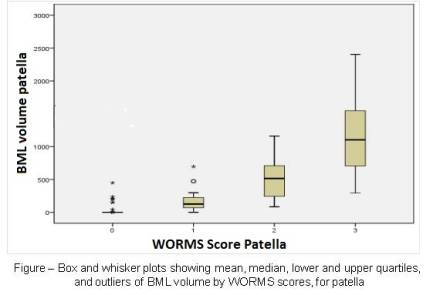Session Information
Session Type: Abstract Submissions (ACR)
Background/Purpose : We recently developed an efficient semi-automated measure of tibial and femoral BML volume and validated it against the Whole-Organ Magnetic Resonance Imaging Score (WORMS). Since patella-femoral (PFJ) osteoarthritis (OA) is increasingly being recognized as a cause of knee pain in OA, we have extended the method to the PFJ. The purpose of this study was to compare PFJ BML volumes with WORMS, and test the hypothesis that PFJ BML volume is associated with stair-climbing pain (but not walking or standing pain).
Methods: 115 subjects from the baseline data of the Osteoarthritis Initiative (OAI) Progression Cohort whose knees were WORMS-scored by OAI central imaging were included. Sagittal turbo spin echo fat saturated (TSE FS) (0.357 x 0.357 x 3.0 mm, TR 3200ms, TE 30ms) IW MRI were obtained on a 3T Siemens Trio MR system. A reader used software to segment subchondral BMLs in the patella and anterior femur (trochlea). The software applies a grayscale thresholding algorithm to the raw image and reader judgment is used to select, usually with 1 or 2 mouse clicks, the clinically appropriate region(s) of BML. Reliability on a random sample of 20 subjects was: ICC 0.96, and 0.97 for intra-and inter-reader respectively.
Primary outcome: segmented volume of BMLs (mm3) in the patella and trochlear femoral compartment.
WORMS score: Comparison of PFJ BML volume was made with OAI public-release WORMS scoring for the patella and trochlea. WORMS reports BML in 4 categories based on size of BML relative to the total sub-region (0-no BML, 1-<25%, 2-25-50%, 3->50%). Spearman’s correlation and Kruskall-Wallis tests were used to assess association between the two methods.
Pain. We used the WOMAC pain sub-scale and defined the primary outcome of knee pain dichotomously as moderate to severe pain (scores 2-4) on any of the 3 weight-bearing (WB) WOMAC pain questions (pain on walking, climbing stairs, standing), acquired at the same baseline OAI visit as the MRI scans. Kruskall-Wallis test were used to assess the associations.
Results: The sample was 84% white, 52% male and were 90% K-L grade 2 and 3. Median BML volumes were progressively larger by WORMS category for patella (figure), trochlea and PFJ (all p<0.001) and strongly correlated (Spearman's r = 0.89, 0.74 and 0.81 respectively, all p=0.000). We found significant positive associations between stair-climbing pain and PFJ BML volume but not for other WOMAC WB pain items.
Conclusion: This study reports good criterion and clinical validation of an efficient method for measuring BML in the PFJ, providing a a potentially useful tool for trials in the PFJ.
Disclosure:
C. Ratzlaff,
None;
J. W. Duryea,
None.
« Back to 2013 ACR/ARHP Annual Meeting
ACR Meeting Abstracts - https://acrabstracts.org/abstract/validation-of-a-rapid-quantitative-method-of-magnetic-resonance-imaging-detected-osteoarthritis-related-bone-marrow-lesions-in-the-patellofemoral-joint/


